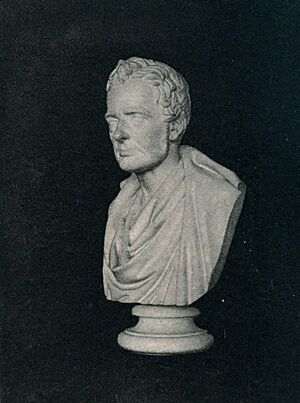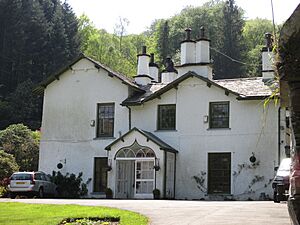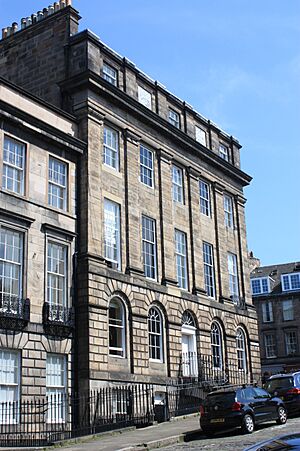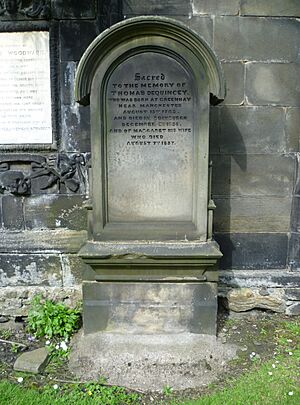Thomas De Quincey facts for kids
Quick facts for kids
Thomas De Quincey
|
|
|---|---|
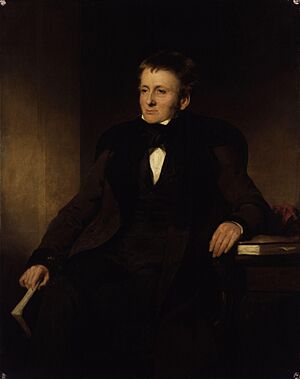
Thomas de Quincey by Sir John Watson-Gordon
|
|
| Born | Thomas Penson Quincey 15 August 1785 Manchester, Lancashire, England |
| Died | 8 December 1859 (aged 74) Edinburgh, Scotland |
| Resting place | St Cuthbert's Churchyard, Edinburgh, Scotland |
| Signature | |
 |
|
Thomas Penson De Quincey (born August 15, 1785, died December 8, 1859) was an English writer. He was known for his essays and literary criticism. He wrote about many different topics.
Contents
Early Life and Education
A Young Student's Journey
Thomas Penson Quincey was born in Manchester, England. His father was a successful merchant who loved books. When Thomas was young, his family moved to a bigger country house.
In 1796, after his father passed away, Thomas's mother changed their last name to De Quincey. That same year, she sent him to King Edward's School in Bath. Thomas was often sick and spent a lot of time alone.
His mother was very smart and strong. She raised her children strictly. She took Thomas out of school after three years. She worried he might become too proud. Then she sent him to a less good school.
Discovering a Love for Books
Around 1799, Thomas De Quincey first read Lyrical Ballads. This book was written by William Wordsworth and Coleridge. It helped him feel better when he was sad. It also made him admire Wordsworth greatly.
By age 15, Thomas was ready for University of Oxford. His teachers said he was very smart for his age. He was sent to Manchester Grammar School. The plan was for him to get a scholarship there. But he left after only 19 months.
Thomas first wanted to find Wordsworth. But he was too shy. So he went to Chester to see his sister. His family found him there. His uncle helped him get a small amount of money each week. This money was for him to travel alone through Wales.
While traveling, he slept in tents or with kind villagers. He ate berries to save money. He often did not have enough food. From July to November 1802, he lived as a wanderer. He lost his weekly money because he did not tell his family where he was.
He went to London to borrow more money. But he could not find any. He chose to almost starve rather than go back to his family. Later, his friends found him. They brought him home.
Life at Oxford and the Lake District
Thomas was finally allowed to go to Worcester College, Oxford. He had less money there. People at the college thought he was strange. He did not spend time with others. He finished his studies but did not get a degree.
He met Coleridge and Wordsworth. In 1809, he moved to Grasmere in the Lake District. He lived in Dove Cottage for ten years. Wordsworth had lived there before him. Today, it is a popular place for tourists.
He lived for five more years at Foxghyll Country House. In 1816, De Quincey got married. He had no money left. So he started to work seriously as a writer. His wife, Margaret, had eight children. She passed away in 1837.
Writing Career
Becoming a Journalist
In July 1818, De Quincey became the editor of the Westmorland Gazette. This was a newspaper that supported the Tory party. But he often missed his deadlines. In June 1819, the newspaper owners were unhappy. He resigned in November 1819.
De Quincey often wrote about politics. He believed in the rights of wealthy people. He was against ideas like the Peterloo massacre and the Sepoy rebellion. He also did not support giving more rights to common people.
He also believed that the British Empire was good. He thought it was fair, no matter the cost. He was against slavery. But he did not support the movement to end slavery in Britain.
In his articles for The Edinburgh Post, he wrote about this issue. He said that anti-slavery groups were only trying to gain power. He worried that ending slavery would harm the British Empire. He thought it might cause uprisings. Instead, he suggested that slave owners should slowly make changes themselves.
Translator and Essayist
In 1821, he went to London. He wanted to sell some of his translations from German books. From then on, De Quincey earned money by writing for magazines. He moved from London to Edinburgh, Scotland. He spent the rest of his life there.
He wrote many articles for Blackwood's Edinburgh Magazine and Tait's Magazine. Some of his famous works appeared in these magazines. These include Suspiria de Profundis (1845) and The English Mail-Coach (1849). His essay Joan of Arc (1847) was in Tait's.
Between 1835 and 1849, Tait's published a series of his memories. These were about Wordsworth, Coleridge, Robert Southey, and other Lake Poets. This series is considered one of his most important works.
Financial Challenges
Struggling with Money
De Quincey often had money problems throughout his life. When he was 21, he received money from his father's estate. It was £2,000. He was too generous with his money. He lent money to friends, like £300 to Coleridge in 1807. These loans were often not paid back.
After leaving Oxford, he tried to study law. But he did not do well. He had no steady income. He spent a lot of money on books. He loved collecting books his whole life. By the 1820s, he was always in debt.
More than once, he had to hide from being arrested for debt. He found safety in Holyrood in Edinburgh. At that time, people could not be arrested for debt inside Holyrood Park. Debtors could only leave on Sundays. This was because arrests for debt were not allowed on Sundays. But De Quincey still got into more debt even while he was there.
His money situation got better later in his life. His mother passed away in 1846. This gave him an income of £200 each year. When his daughters grew up, they managed his money better than he ever did.
Later Life and Death
Thomas De Quincey passed away in his rooms in Edinburgh. He was buried in St Cuthbert's Church yard. This church is at the west end of Princes Street. His grave is simple. It does not mention his writings. His home on Lothian Street was taken down in the 1970s.
Collected Works
In the last ten years of his life, De Quincey worked on collecting his writings. A publishing company in Boston, USA, called Ticknor and Fields, first suggested this. They asked for his help. But De Quincey often put things off. So the American publisher started without him. They reprinted his works from magazines. Twenty-two volumes of De Quincey's Writings were published from 1851 to 1859.
This American edition led to a British edition. From 1850, De Quincey wrote regularly for an Edinburgh magazine. Its publisher, James Hogg, decided to publish Selections Grave and Gay from Writings Published and Unpublished by Thomas De Quincey. De Quincey edited his works for this edition. The first book came out in 1853. The last one was published in 1860, after he died.
These collections were large, but they did not include everything he wrote. Later, a scholar named David Masson tried to make a more complete collection. The Works of Thomas De Quincey came out in 14 volumes in 1889 and 1890. But De Quincey wrote so much that even more collections followed. His diary from 1803 was published in 1927. A new book of his essays came out in 1966.
Influence on Other Writers
De Quincey had a big impact on many writers. These included Edgar Allan Poe, Charles Baudelaire, and Nikolai Gogol. Even famous writers from the 20th century, like Jorge Luis Borges, admired his work. They said he partly influenced them.
Filmmaker Dario Argento used De Quincey's Suspiria as an idea for his "Three Mothers" film series. These films are Suspiria, Inferno, and The Mother of Tears. This influence also carried over to the 2018 film version of Suspiria.
De Quincey was also very good at ancient Greek. This was well-known in the 1800s. An Episcopal priest named Treadwell Walden used a letter from De Quincey's Autobiographic Sketches. This was to support his ideas about how a Greek word was mistranslated in the Bible.
Major Publications
- On the Knocking at the Gate in Macbeth (1823)
- Walladmor (1825)
- On Murder Considered as one of the Fine Arts (1827)
- Klosterheim, or the Masque (1832)
- Lake Reminiscences (1834–40)
- Revolt of the Tartars (1837)
- The Logic of Political Economy (1844)
- Suspiria de Profundis (1845)
- The English Mail-Coach (1849)
- Autobiographic Sketches (1853)
See also
 In Spanish: Thomas de Quincey para niños
In Spanish: Thomas de Quincey para niños
 | Sharif Bey |
 | Hale Woodruff |
 | Richmond Barthé |
 | Purvis Young |


